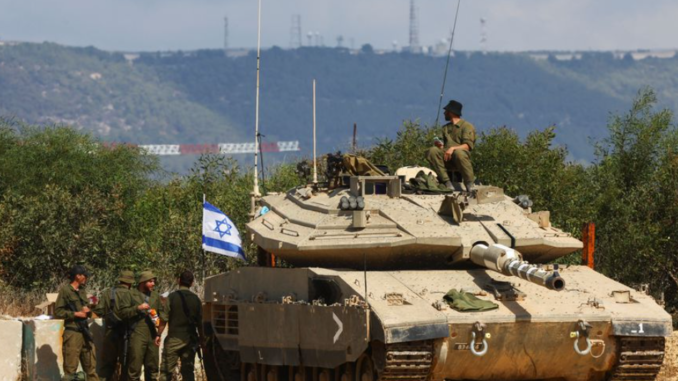
Israeli forces continued their airstrikes on Gaza on Monday despite diplomatic attempts to arrange a ceasefire for the evacuation of foreign passport holders and the delivery of aid to the besieged Palestinian enclave. Gaza residents reported that the overnight airstrikes were the most intense yet, marking the 10th day of conflict with an impending Israeli ground offensive.
Throughout the day, the bombing persisted, resulting in the destruction of numerous buildings, trapping more people under the rubble. Israeli officials issued multiple warnings about rocket fire from Hamas into Israel.
Diplomatic efforts have been ongoing to facilitate aid delivery to Gaza, which has endured relentless Israeli bombings since the October 7 attack by Hamas militants, resulting in 1,300 casualties – the deadliest single day in Israel’s 75-year history.
However, Israel’s chief military spokesperson, Rear Admiral Daniel Hagari, declared that there was no Gaza ceasefire and that Israeli operations were ongoing. He stated, “There are no such efforts underway at this time. If anything changes, we will inform the public. We are continuing our fight against Hamas, this murderous organization that carried out these assaults.”
Israel has imposed a full blockade and is preparing for a ground invasion to enter Gaza and dismantle Hamas, which has continued to launch rockets at Israel. On Monday, rocket warning sirens sounded in several southern Israeli towns. Israeli troops and tanks are already stationed along the border.
Authorities in Gaza reported at least 2,750 casualties from Israeli airstrikes, with a quarter of them being children, and nearly 10,000 people wounded. An additional 1,000 individuals were missing and believed to be under the rubble.
With essential supplies like food, fuel, and water running low, hundreds of tons of aid from various countries have been held up in Egypt pending a safe delivery to Gaza and the evacuation of foreign passport holders through the Rafah border crossing.
Earlier on Monday, Egyptian security sources had informed Reuters about an agreement to open the crossing for aid delivery. However, Israeli Prime Minister Benjamin Netanyahu’s office refuted this claim, stating, “There is currently no truce and humanitarian aid in Gaza in exchange for getting foreigners out.”
Hamas official Izzat El Reshiq also denied the reports of the crossing opening or a temporary ceasefire. Egypt stated that Israeli bombardments on the Palestinian side had rendered the crossing inoperable, and the Israeli government had not taken a stance to allow its reopening.
In Gaza, a small crowd gathered at the Rafah border crossing, the only one not controlled by Israel, waiting to enter Egypt.
The United States has advised its citizens in Gaza to evacuate, and it is working to secure the release of 199 hostages that Israel claims were taken by Hamas back into Gaza. Among the hostages are elderly individuals, women, children, and foreigners, including Americans.
U.S. President Joe Biden has sent military aid to Israel but has also emphasized the importance of providing humanitarian aid to Palestinian civilians and urged Israel to adhere to the rules of war in its response to Hamas attacks.
In the north of Gaza, where Israel alleges that Hamas militants are using an elaborate tunnel network, locals reported Israeli airstrikes near the Al-Quds hospital early on Monday, causing damage to surrounding houses and forcing hundreds of people to seek shelter in the Red Crescent-run hospital. Israeli planes also targeted three headquarters of the Civil Emergency and Ambulance Service in Gaza City, resulting in five casualties and impeding rescue services.
Israel has urged Gazans to evacuate to the south, where hundreds of thousands have already relocated, but Hamas has advised residents to ignore these instructions. People fear Israeli airstrikes in southern Gaza as well.
In Khan Younis refugee camp in southern Gaza, a family of five was killed. The situation is dire, with reserves of fuel at all hospitals across Gaza expected to last only around 24 more hours, putting thousands of patients at risk, according to the United Nations humanitarian office (OCHA). Over one million people, nearly half the population of Gaza, have been displaced within the enclave, overwhelming efforts to meet their needs.
Gaza has been without electricity for five consecutive days, pushing vital services, including health, water, and sanitation, to the brink of collapse. People are resorting to brackish water from agricultural wells, raising concerns about the spread of disease.
As U.S. Secretary of State Antony Blinken arrived in Israel for talks, U.S. officials warned of the potential escalation of the conflict between Israel and Hamas, particularly after cross-border clashes between Israel and Iranian-backed Hezbollah militants in Lebanon.
Iran criticized the United States, holding it accountable for its role in the conflict, as American aircraft carriers headed to the region. Israel announced the evacuation of residents from 28 villages on the border with Lebanon following a missile attack by Iranian-backed Hezbollah on Sunday, resulting in one civilian casualty.

Be the first to comment